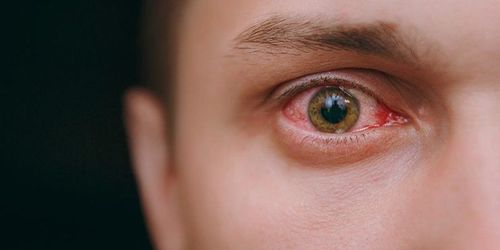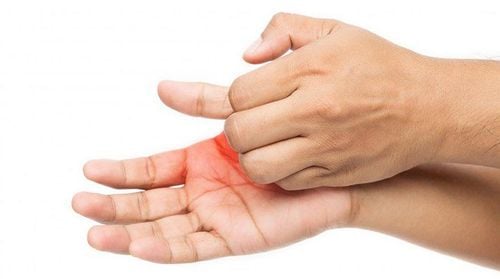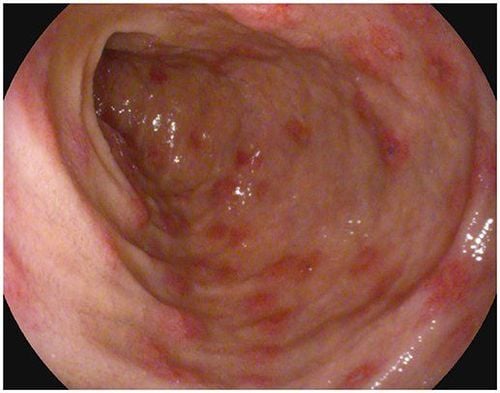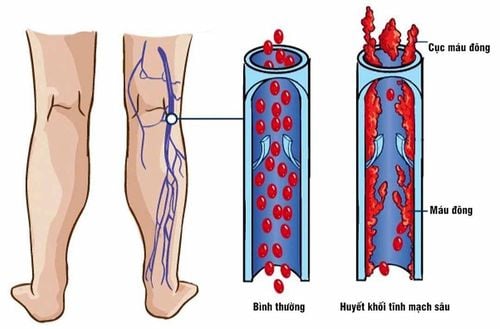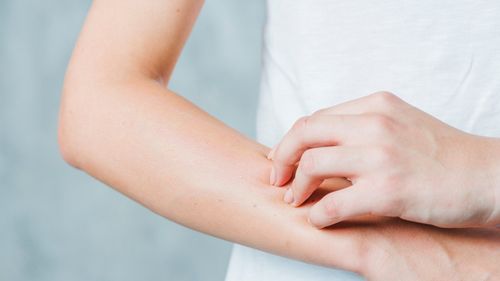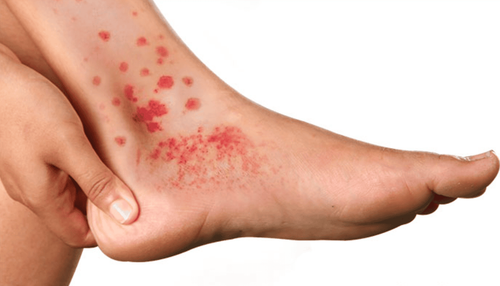This is an automatically translated article.
Behcet's disease is a rare disorder characterized by inflammation of the blood vessels throughout the body. Initially, the disease has many signs and symptoms that are difficult to diagnose such as mouth ulcers, eye inflammation, skin rashes, lesions and ulcers of the genitals.1. What is behcet's disease?
Pathologically, Behcet's syndrome, also known as Behcet's syndrome, is a chronic multisystem inflammatory disorder characterized by oral and genital sores, skin lesions, and ocular abnormalities.In some people, the disease also causes arthritis (swelling, pain, stiffness), skin problems, and inflammation of the digestive tract, brain, and spinal cord. Although Behcet's disease can occur at any age, symptoms usually begin when a person is in their 20s or 30s.
The exact cause of Behçet's disease is unknown, but it is thought to be an autoimmune disease, which occurs when a person with a genetic predisposition to developing Behçet's disease is exposed to certain environmental agents (such as infection) infection) causes the immune system to function abnormally.
Many studies show that people with Behçet's disease, especially those of Middle Eastern and Asian descent, have many genes in the human leukocyte antigens (HLA) system, especially HLA-B51 gene is higher than the general population, leading to an increased risk of disease.
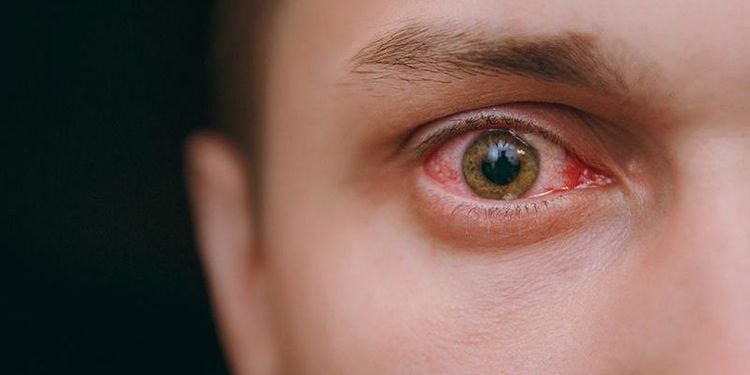
Bệnh behcet gây ra những bất thường ở mắt
2. Symptoms of Behcet's disease
The symptoms of Behcet's disease vary from person to person, and the disease may go away on its own or in remission over time. Signs and symptoms depend on which part of the body is affected.Parts commonly affected by Behcet's disease include:
Mouth. Painful mouth sores that look like mouth sores are the most common sign of Behcet's disease. The sores start out as round and then quickly rise in the mouth and turn into sores. The sores usually heal in one to three weeks, although they still recur. Skin. Some people develop sores on the skin or on the skin that appear red, raised bumps on the surface of the skin that are tender to the touch and often appear on the lower leg. Genitals. Red sores and open sores in the scrotum or vulva are painful and can leave scars. Eye. Uveitis causes redness, pain, and blurred vision, often in both eyes. Joint. Symptoms such as joint swelling and pain often occur in the knees of people with Behcet's disease. Also, can occur in the ankle, elbow, or wrist. These symptoms last one to three weeks and go away on their own. Blood vessel. Inflammation of the veins and arteries that causes redness; If there is a blood clot, there will be additional symptoms such as pain and swelling in the arm or leg. Inflammation in the large arteries can lead to serious complications such as aneurysms and narrowing or blockage of the vessel. Gastrointestinal system. A variety of signs and symptoms affect the digestive system, including abdominal pain, diarrhea, and bleeding. Brain. Encephalitis and inflammation of the nervous system cause headaches, fever, disorientation, loss of balance or stroke.
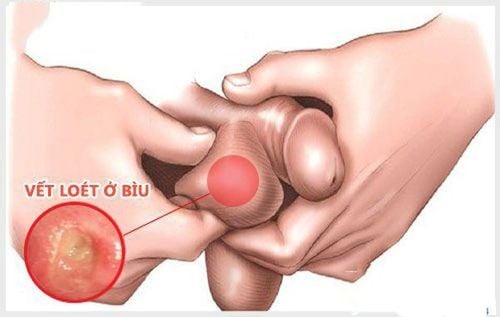
Triệu chứng của bệnh Behcet ở bộ phận sinh dục nam
3. Diagnosis of Behcet's disease
There's currently no test that can definitively determine if a person has Behcet's disease, so doctors primarily make a diagnosis based on a person's signs and symptoms. Almost all patients with this condition develop mouth ulcers at least three times in 12 months, which is essential for the diagnosis of Behcet's disease.In addition, for the diagnosis of Behcet's disease, the patient should have at least two additional signs as follows:
Recurrent genital ulcers Eye inflammation Skin sores Tests may be needed such as:
Laboratory tests blood or other specimens to rule out symptoms caused by another disease. Pathergy test. The doctor will do this by inserting a sterile needle into the patient's skin and examining the punctured area after one to two days. If the test is positive, a small red bump will appear on the skin where the needle was inserted. This phenomenon shows that the patient's immune system overreacts even to a very small wound.
4. Treatment of Behcet's disease
Currently, there is no cure for Behcet's disease. If you have mild symptoms, your doctor may prescribe medications to control pain and inflammation.For more severe signs and symptoms, your doctor may prescribe medication to control Behcet's disease throughout your body.
4.1 Medications to control signs and symptoms Lotions, gels, and ointments. Corticosteroid medications are applied directly to skin and genital sores to reduce inflammation and pain. Use mouthwash containing corticosteroids and other ingredients to relieve mouth pain. Using eye drops containing corticosteroids or other anti-inflammatory medications can relieve pain and reduce redness if the inflammation is mild.
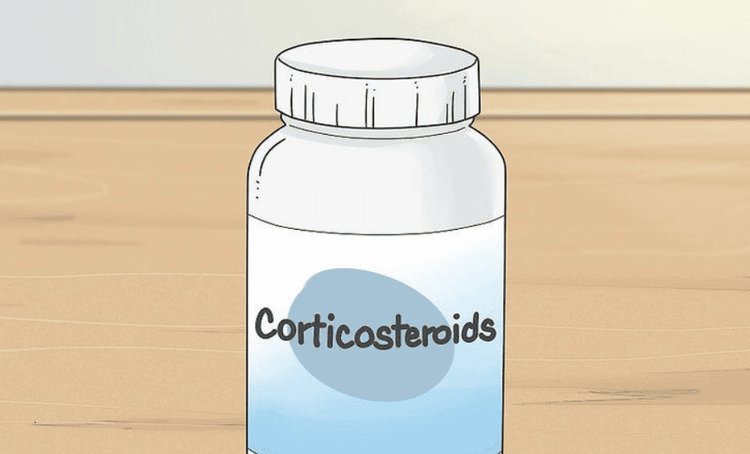
Corticosteroid được lựa chọn trong điều trị Behcet
In more severe cases, doctors must perform other treatments to control complications of Behcet's disease. If you have moderate to severe condition, your doctor may prescribe the following:
Corticosteroids to control inflammation, such as prednisone. Doctors often prescribe another medication to suppress the immune system. Side effects of corticosteroids include weight gain, persistent heartburn, high blood pressure, and osteoporosis. Medicines that suppress the immune system. The inflammation in Behcet's disease can be reduced with medications that suppress the patient's immune system from attacking healthy tissue. These medications may include azathioprine (Azasan, Imuran), cyclosporine (Gengraf, Neoral, Sandimmune), and cyclophosphamide. However, the side effects of these drugs increase the risk of infection. Medications that change the immune system's response. Interferon alfa-2b (Intron A) works to regulate the activity of the patient's immune system to control inflammation. It may be used alone or in combination with other medicines to help control skin sores, joint pain, and eye inflammation in people with Behcet's disease. Side effects include flu-like signs and symptoms, such as muscle aches and fatigue. If you have any questions, you can contact Vinmec Health System nationwide, or register online HERE.
Article referenced source: Mayoclinic.org
MORE:
Is genital herpes a genital warts? Skin ulcers in the elderly The most basic facts about genital herpes




